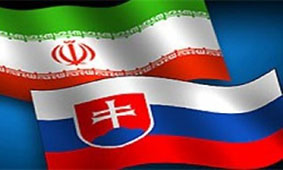
Slovakia Eyeing Enhancement of Trade with Iran under SPV


Slovakian Finance Minister Peter Kažimír and the country’s Deputy Foreign Minister Peter Žiga, in separate meetings with Iran’s Deputy Foreign Minister for Political Affairs Seyed Abbas Araqchi, said that they are determined to have further relations with Iran once the European special financial channel with Iran is established.
The Two Slovakian official discussed implementation of the Special Purpose Vehicle (SPV), in their meetings with Araqchi on Wednesday in capital city of Bratislava, the second leg of Araqchi’s 3-nation tour.
During his separate meetings with Slovakian officials, Araqchi held talks on developing bilateral relations specially in economic and political fields as well as important regional and international developments.
Slovakian officials also expressed hope for finalizing the SPV promptly to support economic cooperation.
They also extended support for developing bilateral cooperation and continuation of consultations.
Araqchi, who started his European tour in Austrian capital city of Vienna, will also visit Bulgaria on the third leg of his tour.
In a related front, earlier on January 06, a host of Slovakian business activists visited Tehran, and met with Deputy Chairman of the Iranian Parliament’s Energy Commission Hossein Amiri Khamkani.
In the meeting, the Slovakian business activists reassured that they are resolute to strengthen cooperation on renewable energies.
Slovak economic activists referred to the long-standing friendship between the two countries of Iran and Slovakia, saying "we, as economic activists, will strive to further strengthen the business relationship between the two countries."
Slovak business activists added, "We have good experience in renewable energy and we want to strengthen our cooperation with Iran in that area.”
Also during the meeting, the two sides called for developing and strengthening of bilateral trade relations and cooperation on renewable energies.
Amiri Khamkani, in turn, pointed to Iran's economic and trade relations with Slovakia, saying “the Iranian Parliament welcomes developing and strengthening of its relations with Slovakia in various fields”.
Referring to economic relations between the two countries, Amiri Khamkani emphasized the readiness of Iranian Parliament to facilitate trade between the two countries.
The senior lawmaker further stated, “We hope to see an increase in the level of economic relations, especially in the area of renewable energy.”
In a related front, in March 2017, Slovakian Ambassador to Tehran Luber Mirgelian said that his country's companies have boosted their investments in Iran.
"After opening of credit line worth 100 million euros during recent visit by my country's officials to Iran indicates that Slovakia supports investment in Iran," Mirgelian said in a meeting with Head of Iran-Slovakia Parliamentary Group Mehdi Farshadan in Tehran.
The Slovakian ambassador assessed bilateral ties as positive, hoping that relations would further improve following the removal of sanctions and settlement of banking problems.
Farshadan, for his part, pointed to good ties between Iran and Slovakia, and said hat excellent bilateral relations since the country’s independence are an appropriate ground for bolstering ties in various domains.
He also described removal of obstacles such as facilitating visa issuance as a major contributor to boosting bilateral ties.
Europeans' honesty in dealing with the Iran nuclear deal is seriously doubted by Iranian masses that are discontent with talks with European counterparts.
In contrast with what European politicians and government are stating, many experts in Iran are suspicious of Europe's genuine commitment to the letters of the nuclear agreement of July 14, 2015, and are voicing their discontent with what they describe as Europe's strategy of killing time.
Even some commentators like Seyed Mostafa Khoshchashm are calling the Iranian government to start meaningful modifications in JCPOA undertakings, and specially remove the cap on the country's enriched uranium stockpile after the US unilateral withdrawal from the agreement; a call which is gaining momentum among the Iranians.


Trump weighs using $2 billion in CHIPS Act funding for critical minerals

Codelco cuts 2025 copper forecast after El Teniente mine collapse

Electra converts debt, launches $30M raise to jumpstart stalled cobalt refinery

Barrick’s Reko Diq in line for $410M ADB backing

Abcourt readies Sleeping Giant mill to pour first gold since 2014

Nevada army depot to serve as base for first US strategic minerals stockpile

SQM boosts lithium supply plans as prices flick higher

Viridis unveils 200Mt initial reserve for Brazil rare earth project

Tailings could meet much of US critical mineral demand – study

Kyrgyzstan kicks off underground gold mining at Kumtor

Kyrgyzstan kicks off underground gold mining at Kumtor

KoBold Metals granted lithium exploration rights in Congo

Freeport Indonesia to wrap up Gresik plant repairs by early September

Energy Fuels soars on Vulcan Elements partnership

Northern Dynasty sticks to proposal in battle to lift Pebble mine veto

Giustra-backed mining firm teams up with informal miners in Colombia

Critical Metals signs agreement to supply rare earth to US government-funded facility

China extends rare earth controls to imported material

Galan Lithium proceeds with $13M financing for Argentina project

Kyrgyzstan kicks off underground gold mining at Kumtor

Freeport Indonesia to wrap up Gresik plant repairs by early September

Energy Fuels soars on Vulcan Elements partnership

Northern Dynasty sticks to proposal in battle to lift Pebble mine veto

Giustra-backed mining firm teams up with informal miners in Colombia

Critical Metals signs agreement to supply rare earth to US government-funded facility

China extends rare earth controls to imported material

Galan Lithium proceeds with $13M financing for Argentina project

Silver price touches $39 as market weighs rate cut outlook

















